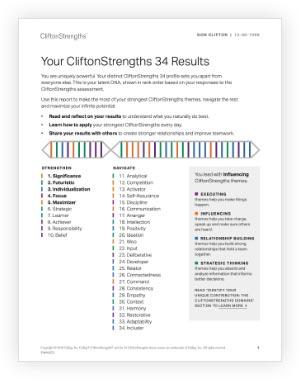Story Highlights
- Managers are the most important factor when building successful teams
- Successful teamwork and engagement start at the individual level
- CliftonStrengths helps managers understand their team as a whole
- Read more about how to improve teamwork among employees
The quality of your managers is the single most important factor when building engaged and successful teams.
That's because, among other reasons, your managers account for 70% of the variance in employee engagement.
But another important aspect of what makes a successful team is how your managers provide the conditions for great teamwork.
By studying great managers and their teams for over five decades, Gallup has found that many of the essential elements of employee engagement are the same points of focus that managers use to improve teamwork and collaboration.
Why does great teamwork matter?
Well, according to John C. Maxwell, it makes the dream work.
For managers, that dream is, of course, greater employee engagement and team performance -- the outcomes that drive your company's organic growth.
Successful teamwork starts at the individual level. So, too, does a team's engagement.
When managers lead with a focus on engagement, they give themselves a chance to set each employee up for greater performance in their role.
The impact of scaling this type of performance improvement at the individual level across an entire team is massive.
Many of the essential elements of employee engagement are the same points of focus that managers use to improve teamwork and collaboration.
Our research, based on Q12 survey results from over 1.8 million employees across more than 82,000 teams in organizations spanning nearly 50 industries, finds direct correlations between employee engagement and team- and organizational-level outcomes such as:
- higher sales and profitability
- greater productivity
- lower turnover and absenteeism
Improving these critical performance outcomes in your company is directly related to your managers' ability to foster teamwork through the lens of employee engagement.
How can managers improve teamwork?
Gallup research finds a number of ways managers can build great teams through enhanced teamwork.
1. Start with knowing employees' CliftonStrengths. The best managers use the CliftonStrengths assessment to discover each team member's talents and strengths. Because before a manager can expect their employees to work well together, they have to know what each employee naturally does best.
That doesn't necessarily mean knowing the tasks and jobs each person performs well; it means understanding what makes each employee inherently and uniquely talented.
Plus, when employees are empowered to discover their CliftonStrengths, their managers are equipped to better understand the make-up of the team as a whole. They can make tough and discerning decisions about who can best perform each role as the team evolves and grows. They know which team members lead with specific strengths -- and how to position people accordingly to foster complementary partnerships.
It is those kinds of partnerships that form the foundation for effective teamwork.
2. Ensure that you're being a coach for each employee, and not a boss. Knowing employees' CliftonStrengths doesn't mean much if managers don't give their people the chance to use what makes them uniquely talented in their daily work.
Gallup's Q12 employee engagement survey includes an item that measures exactly how well employees feel their manager sets them up to succeed using their CliftonStrengths:
Q03: At work, I have the opportunity to do what I do best every day.
When employees can strongly agree with that statement, it means they are using their natural talents and strengths to tackle every task and approach every challenge.
It also means they have a manager who understands exactly how they are most likely to succeed in a certain project or a specific role.
And if a full team of employees can strongly agree that they have the opportunity to do what they do best every day, that means they're doing so in conjunction with each other -- a sort of additive effect that can pay massive dividends for collaborative teamwork.
When employees are empowered to discover their CliftonStrengths, their managers are equipped to better understand the make-up of the team as a whole. They can make tough and discerning decisions about who can best perform each role as the team evolves and grows.
3. Lead team members using other key elements of employee engagement. It is vitally important that managers know their employees' CliftonStrengths and use that knowledge to build a team that collaborates and works well together.
But a strengths-based approach is only part of what makes a great team.
- Managers must ensure each employee knows what's expected of them at work and has the materials and equipment they need to do their work right.
- Managers must create a culture that values providing genuine recognition for work well done.
- Managers must care about their employees, encourage their personal and professional development, and respect their opinions.
- Managers must help employees understand how their work ties to the mission or purpose of the organization.
- Managers must foster a team environment where employees can develop real, lasting friendships with one another.
Teams composed of employees who can strongly agree that their manager does these things are teams that succeed, period. They have employees who know how to work as a team -- employees who value one another's talents and know how to get the best out of each other to deliver team success.
Great teamwork begins with great managers who lead with a focus on engagement. Create a company full of those kinds of managers to develop an organization full of teams that work together to exceed expectations.
Make engagement and teamwork a central part of your managers' mission:
- Teams that use their strengths perform better. Give teams the opportunity to do what they do best with the CliftonStrengths assessment.
- Download Gallup's employee engagement perspective paper to learn what engaged organizations do differently.
- Request a demo for Gallup Access and explore how Team Strengths Grids can help identify what teams do best.





